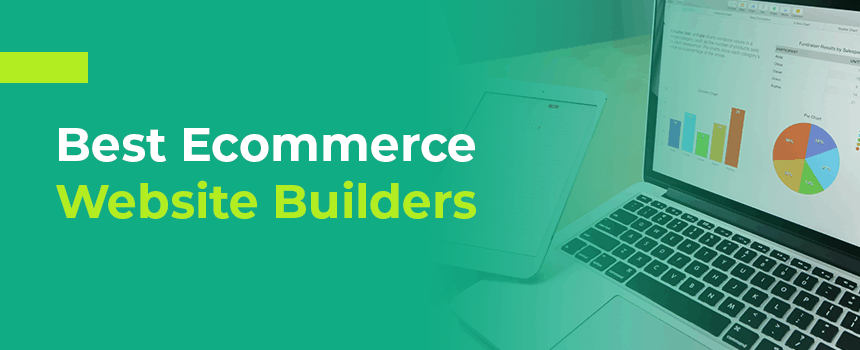Choosing the best eCommerce website builder is crucial for your online store’s success. The right platform can streamline the setup, management, and growth of your business. This guide highlights the top eCommerce website builders, helping you find the right one based on your specific needs, whether you’re a small business, an entrepreneur, or a large enterprise. What Are eCommerce Website Builders? ECommerce website builders are specialized platforms that allow users to create and manage online stores easily. Unlike traditional website builders, they offer features tailored to selling products, such as payment processing, product management, and inventory tracking. They simplify the process of running an online store without requiring technical expertise, making them accessible to businesses of all sizes. Key Features to Look for in eCommerce Website Builders When choosing an eCommerce builder, consider key features like customization options, security, SEO and marketing tools, mobile optimization, and payment gateway integration. These features help ensure a professional, secure, and optimized shopping experience for your customers while enhancing your store’s visibility and scalability. Use Cases for eCommerce Website Builders E-commerce website builders are ideal for small businesses, startups, dropshipping entrepreneurs, and large enterprises. They also cater to artists and creators selling digital or physical products. These platforms provide flexible solutions to accommodate varying business models, ensuring ease of use and scalability. Top 21 Best eCommerce Website Builders Popular eCommerce website builders like Shopify, WooCommerce, BigCommerce, Wix, and Magento cater to different business needs. Whether you’re looking for ease of use, customization, or scalability, there’s an eCommerce platform to match your goals and budget. Shopify Shopify is one of the most popular eCommerce platforms, known for its simplicity, reliability, and scalability. It provides an all-in-one solution for businesses to create and manage their online stores. Whether you’re a solo entrepreneur or a growing enterprise, Shopify offers tools to customize your store, process payments, and streamline your operations. Unique Features: Shopify excels in its user-friendly interface and extensive integrations. It offers a vast app marketplace, multi-channel selling options, and advanced POS (Point of Sale) systems. Shopify’s localized global selling enables businesses to reach customers worldwide. Additionally, its analytics and reporting tools, combined with an easy setup process, make it a go-to choice for many entrepreneurs. Usability (Pros and Cons): Intuitive and beginner-friendly design with minimal technical knowledge required. Extensive app store with thousands of integrations for extended functionality. Secure hosting and a reliable checkout process with integrated payment solutions. Scalable to support businesses as they grow, from startups to enterprises.Cons: Transaction fees for using third-party payment gateways.Limited customization options for themes without advanced coding knowledge. Costs can increase significantly with the addition of apps and features. Pricing Plans: Shopify offers four main pricing tiers. The Basic Plan starts at $29/month (billed annually) and includes features like 10 inventory locations, 24/7 chat support, localized global selling in 3 markets, and POS Lite. The Shopify Plan, at $79/month (billed annually), adds features such as 5 additional staff accounts and enhanced analytics. The Advanced Plan is priced at $299/month (billed annually), offering custom reports, 15 staff accounts, and advanced analytics. For large businesses, the Plus Plan starts at ₹1,75,000/month (on a 3-year term), providing unlimited staff accounts, priority support, and customizable checkout options. WooCommerce WooCommerce is a free, open-source plugin designed to transform WordPress websites into fully functional eCommerce stores. It’s a highly customizable and cost-effective solution for businesses looking for flexibility and control over their online stores. Unique Features: WooCommerce integrates seamlessly with WordPress, offering a wide range of themes and plugins to create tailored online stores. It supports unlimited product listings, digital downloads, and variable pricing. The platform is ideal for tech-savvy users who want full control over design and functionality. Additionally, WooCommerce is compatible with numerous payment gateways and shipping solutions. WooCommerce’s flexibility is its standout feature, allowing users to customize nearly every aspect of their store. It’s cost-effective for small-scale operations, as there are no subscription fees for the core plugin. Businesses also benefit from full control over store data and the ability to host their store on their preferred platform. However, WooCommerce requires technical knowledge for setup and customization, which may not suit everyone. While the platform itself is free, the costs of hosting, premium themes, and paid plugins can add up, especially for advanced functionalities. Performance issues may also arise without optimized hosting or proper management. Pricing Plans of WooCommerce are free to install, but additional costs include hosting themes, and premium add-ons. Hosting prices typically range from ₹1,500 to ₹15,000 per month, depending on the performance requirements. Premium themes can cost between ₹2,000 and ₹15,000, while advanced plugins for features like SEO, payment gateways, and shipping solutions can further increase expenses. While WooCommerce is highly customizable, it can become costly for businesses with more complex needs. BigCommerce BigCommerce is a feature-rich eCommerce platform designed for businesses of all sizes. Its built-in tools and scalability make it a preferred choice for startups, growing businesses, and enterprises seeking to streamline their online operations. Unique Features: BigCommerce offers advanced tools for SEO, multi-channel selling, and payment integration. Its product management features include unlimited listings and B2B capabilities like custom pricing and multi-currency support. With robust analytics and a seamless checkout process, it’s a versatile platform for retail and wholesale markets alike. Usability (Pros and Cons): BigCommerce is ideal for businesses looking for a comprehensive solution with minimal reliance on third-party apps. Its scalability makes it suitable for businesses of any size, while the absence of transaction fees provides a cost advantage. The platform is also SEO-friendly, helping businesses drive organic traffic, and its multi-channel selling options streamline operations across different marketplaces. On the downside, BigCommerce ties its pricing to annual sales volume, which can increase costs as businesses grow. The platform also has limited free themes compared to competitors, and while it has robust built-in features, some advanced functionalities may require third-party apps or coding expertise. Pricing Plans: BigCommerce pricing starts with the Standard Plan at $39/month, which
E-Commerce & Online Business
- Trendinsaas
- No Comments
- January 30, 2025
The Best E-Commerce Website Builder: Top 21 Choices for Your Online Store
Read More

